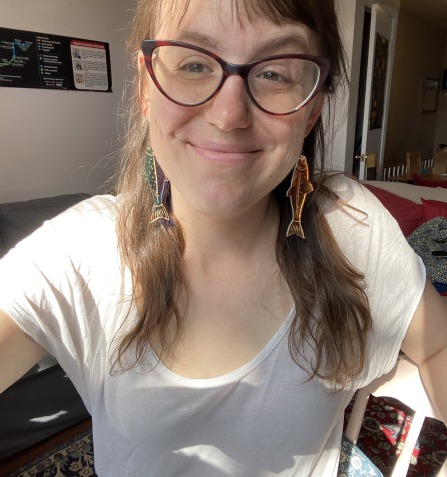Mara arrived in January, as regal as a beech tree, and planted herself in the yellow house across the street. From my bedroom window, I watched her skip rope like she was training for a NASA mission. She was like that from the start: formidable. By the first week she had made friends with almost everybody but me.
I still wore corduroy skirts and tall socks embroidered with apples. I was picked last for kickball. I had straight Bs. “You have such promise,” my teachers said. All around me people were blossoming, but any flowers I could muster yielded only hard, sour fruit. “Crabapple,” my mother called me affectionately, instead of honey, and I hated how well it fit.
In February, our science teacher paired Mara and me for a project. She thought Mara would rub off on me. Make me braver, maybe, less prone to sputter in class. But every time Mara got another answer right, anger fermented in my chest. When she raised her hand, the skin on her forearm was so thin I could see the blood moving. I dismantled a paper clip beneath my desk and daydreamed about etching my initials onto her skin.
I ran hot in those days: my temperature, my temper. I sweated in T-shirts on days Mara wore thick wool sweaters. She shed fibers every time she moved. Her scratchy sleeves rubbed against my skin. When I scooted away from her, her gray eyes pooled. The next day, her smile was even wider. Her niceness was one more thing I coveted but couldn’t reach.
“You should walk to school with her,” Mom said. “She’s new. She could use a friend.”
“She has more friends than I do.”
Mom laughed and told me that was all the more reason to be nice to her. Still, I scuttled away when she approached me in the hall. I side-stepped her smiles.
But something was changing. The trees in front of our houses draped their arms around each others’ shoulders. In March, we learned about inosculation: what happened when different trees chafed against each other. Their bark wore thin. Their cells merged. The trees grew conjoined. “Husband and wife trees,” our teacher called them. Mara shifted beside me, and I felt flayed. “That’s what we should do our project about,” she whispered.
In April she started waiting in front of my house in the mornings, underneath the kissing, sighing trees. She walked beside me in silence. It’s OK, I told myself. We’re not friends. We’re something else. Neighbors. At the end of the week, she held out her hand, her face serious. “Friends?” she said. I took her hand.
We started studying together, stretched out in her bed or mine. She swapped the story of her parents’ divorce for the location of my brother’s weed stash. We smoked by my open window, giggling against each other’s shoulders. We collapsed in my bed, our arms indistinguishable. We dared each other to become a dolphin, a boat, a rocket, a centipede. We squeezed our eyes shut and contorted our bodies into new shapes. With my eyes closed and hers on me I could be anything. Steel, bark, honey.
From then on, we linked arms in the hallway and split our sentences so we could share them. We made a new kind of fruit: bristly, nutty apples. “We’re going to be this close forever,” I told her. I hadn’t been the kind of person who thought about forever before, but now I was. She rolled her eyes at me, and I rubbed my shoulder against hers. “I mean it,” I swore.
I meant it the day she painted GO on my exposed stomach with pasty blue paint before her sister’s swim meet, and my skin prickled even in the places she didn’t touch. I meant it when we started high school and I memorized the 63 steps between her locker and mine. I meant it right up until the day in 10th grade when we were tangled in her bed, tickling each other senseless, and the joke in her eyes softened. I started to feel light-headed, exuberant, afraid. Her lips against mine were tentative, as if she were the one who didn’t know what to do.
I flinched. She didn’t. I started dating boys. She shaved the left side of her head and brought a girl to prom. I applied for college out-of-state. She stayed and made our town change around her. I told myself I’d never had her certainty anyway.
Still, I tracked her life on Facebook. I marveled at the dizzying shapes of her new friends’ hair. I tried to squelch my jealousy, that old prickly anger at how easily she reached for what I lacked. I closed my laptop and splashed cold water on my face. In the mirror my hair was flat, my eyes sad. Turning away was a habit. It was the only thing I was better at than her.
Then I stopped. I closed my eyes and tried to believe that I could remake myself the way she’d once reshaped me. That I could be anything: a girl, a tree, a rocket, all at the same time. My fingertips prickled, and I tasted apple-crisp beechnuts on my tongue. I turned back to the mirror and searched my eyes for the first flicker of something new.

Pauline Holdsworth is a writer and public radio producer who grew up in central Pennsylvania and now lives in Toronto, Canada. Her fiction has appeared or is forthcoming in Bat City Review, Necessary Fiction, Pithead Chapel, JMWW, and elsewhere. Her work has been shortlisted for The Masters Review 2021 Summer Short Story Award for New Writers and longlisted for the Wigleaf Top 50.